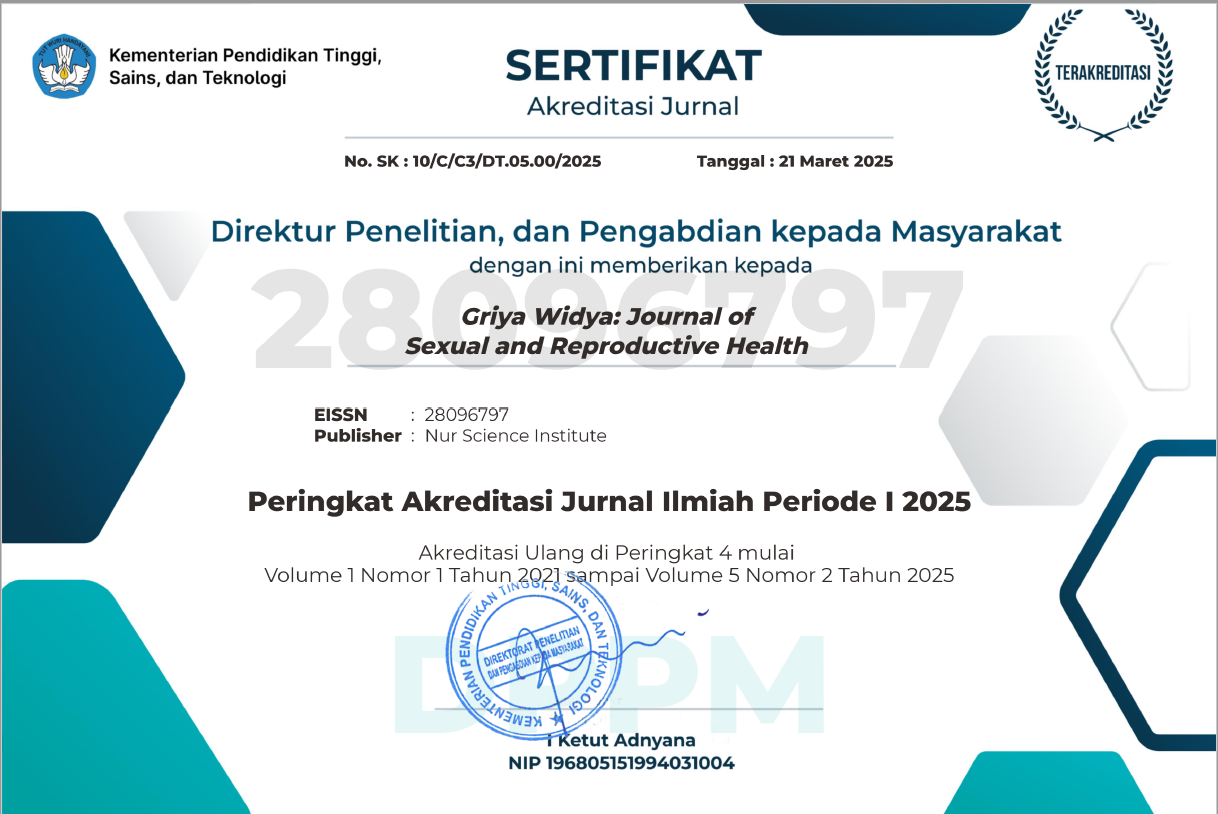Edukasi Hak Kesehatan Seksual Reproduksi dan Kekerasan Gender Berbasis Seksual
Mana yang Paling Diminati Remaja?
Keywords:
Gender, Education, Adolescents, ASRHAbstract
Background: Adolescents are particularly vulnerable to inadequate access to knowledge about sexual and reproductive health rights (HKSR) and gender-based violence (KBGS). This lack of knowledge often leads to misinformation, poor health outcomes, and increased vulnerability to sexual and gender-based violence. Despite efforts to improve HKSR education, many adolescents, especially in rural and underserved areas, continue to face significant barriers in accessing reliable information and services.
Objective: The purpose of this study was to examine the level of knowledge and awareness of HKSR and KBGS among adolescents and to identify the factors that contribute to their vulnerability in accessing this knowledge.
Method: This research employed a quantitative approach with a descriptive observational method. Data were collected through surveys administered to adolescents in various regions, focusing on their knowledge, attitudes, and access to HKSR and KBGS information and services.
Result: The study revealed that 72.4% of adolescents had limited knowledge about HKSR and KBGS. The primary factors contributing to this knowledge gap included lack of comprehensive sexuality education in schools (45.3%), cultural taboos surrounding discussions of sexual and reproductive health (30.6%), and limited access to health services (24.1%).
Conclusion: The findings indicate that inadequate education and cultural barriers significantly impact adolescents' access to HKSR and KBGS information. To address this issue, it is crucial to implement comprehensive sexuality education programs in schools, promote open discussions about sexual and reproductive health, and improve access to health services for adolescents. Addressing these factors can help reduce the vulnerability of adolescents to misinformation and improve their overall health and well-being.
References
Ayad, A. (2024). Teaching Human Reproduction to Secondary School Students: Analysis of Moroccan and Non-Moroccan Teachers' Perceptions. International Journal of Pedagogy & Curriculum, 31(1).
Dube, T. (2022). Vulnerability to child marriage: perspectives of adolescent girls from a resource-poor rural community in Manicaland, Zimbabwe (Doctoral dissertation).
El Kazdouh, H., El-Ammari, A., Bouftini, S., El Fakir, S., & El Achhab, Y. (2019). Perceptions and intervention preferences of Moroccan adolescents, parents, and teachers regarding risks and protective factors for risky sexual behaviors leading to sexually transmitted infections in adolescents: qualitative findings. Reproductive health, 16, 1-17.
Godswill, J. (2014). Adolescents’ sexual and reproductive health challenges in northern Nigeria: road map to effective interventions. International letters of social and humanistic sciences, (13), 1-11.
Hamda, N. (2014). Masyarakat dan Sosialisasi. ITTIHAD, 12(22), 107-115.
Jahja, Y. (2011). Psikologi perkembangan. Kencana.
Mkumba, L. S., Nassali, M., Benner, J., & Ritchwood, T. D. (2021). Sexual and reproductive health needs of young people living with HIV in low-and middle-income countries: a scoping review. Reproductive Health, 18(1), 219.
Nkata, H., Teixeira, R., & Barros, H. (2019). A scoping review on sexual and reproductive health behaviors among Tanzanian adolescents. Public health reviews, 40, 1-15.
Nowshin, N., Kapiriri, L., Davison, C. M., Harms, S., Kwagala, B., Mutabazi, M. G., & Niec, A. (2022). Sexual and reproductive health and rights of “last mile” adolescents. Sexual and Reproductive Health Matters, 30(1), 100-120.
Okyere, J., Yeboa, N. K., Nikoi, C., Owusu-Amoako, M., Ferka, L., Nurzhynska, A., & Amo-Adjei, J. (2024). Adolescent sexual and reproductive health needs and utilisation of health services in the Bono East Region, Ghana. Reproductive Health, 21(1), 87.
Russo, N. F., & Pirlott, A. (2006). Gender‐based violence: concepts, methods, and findings. Annals of the new york academy of sciences, 1087(1), 178-205.
Salam, R., Pramono, D., & Putri, N. A. (2018). Children Care Mainstreaming Sebagai Upaya Pencegahan Kekerasan Terhadap Anak di Kota Semarang. Dimensia: Jurnal Kajian Sosiologi, 7(1).
Tazinya, R. M. A., Hajjar, J. M., & Yaya, S. (2022). Strengthening integrated sexual reproductive health and rights and HIV services programs to achieve sustainable development goals 3 and 5 in Africa. Reproductive Health, 19(1), 223.
Tsamara Aph, T. A. (2023). Peran UNHCR Dalam Menanggulangi Kekerasan Berbasis Gender Terhadap Pengungsi Perempuan Di Makassar Tahun 2015-2020= Unhcr’s Role In Tackling Gender-Based Violence Against Women Refugees In Makassar 2015-2020 (Doctoral dissertation, Universitas Hasanuddin).
Downloads
Published
How to Cite
Issue
Section
License
Copyright (c) 2023 Muhammad Taufik Hilmawan, Dliya Laela Eka Meviana, Risqi Falah Amelia, Selvia Ratih Pramusti

This work is licensed under a Creative Commons Attribution-ShareAlike 4.0 International License.
Authors who publish with this journal agree to the following terms:
The author(s) retain copyright and grant the journal the right of first publication with the work simultaneously licensed under a CC BY-SA 4.0 license that allows others to remix, adapt, and build upon the work even for commercial purposes, as long as they credit the author(s) and license their new creations under the identical terms.
License details: https://creativecommons.org/licenses/by-sa/4.0/



